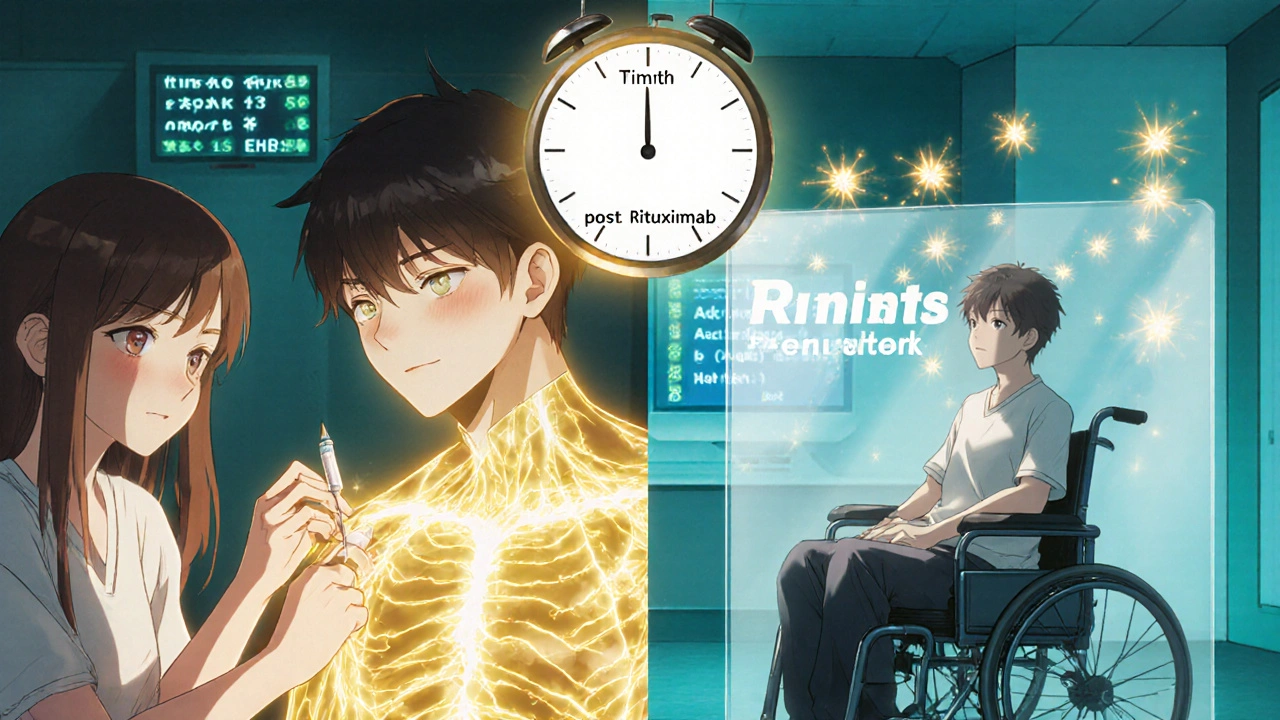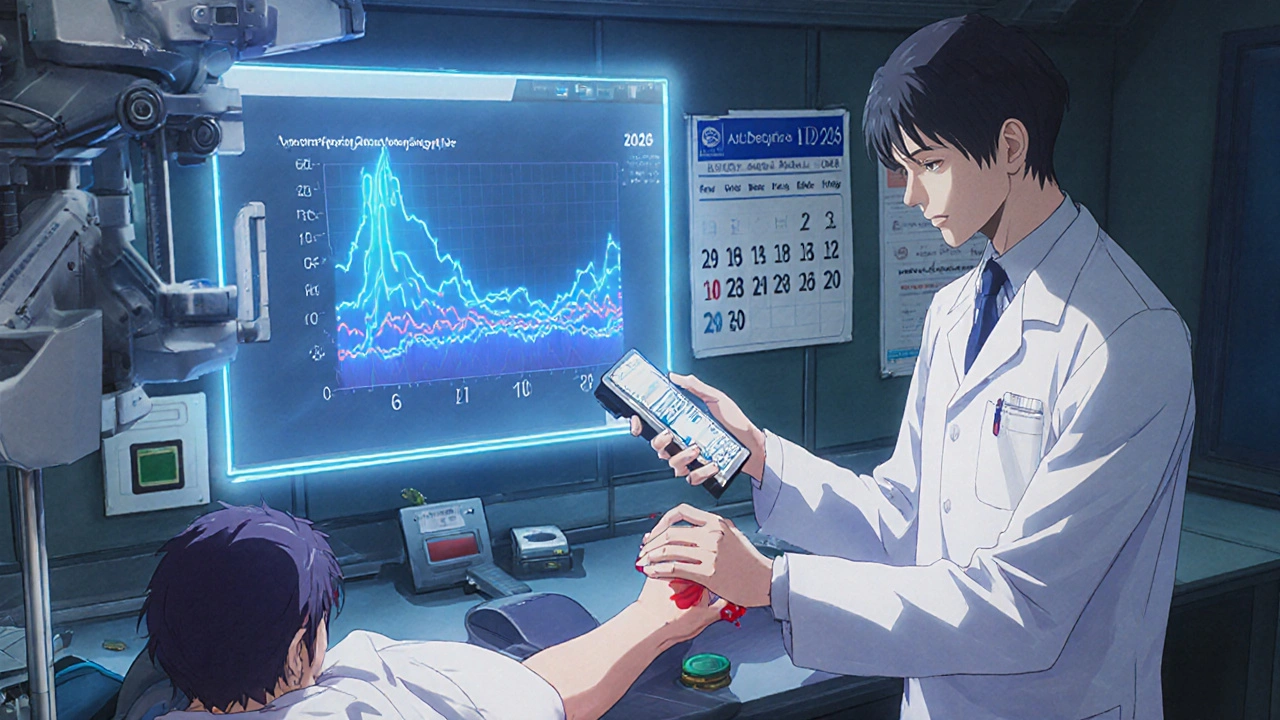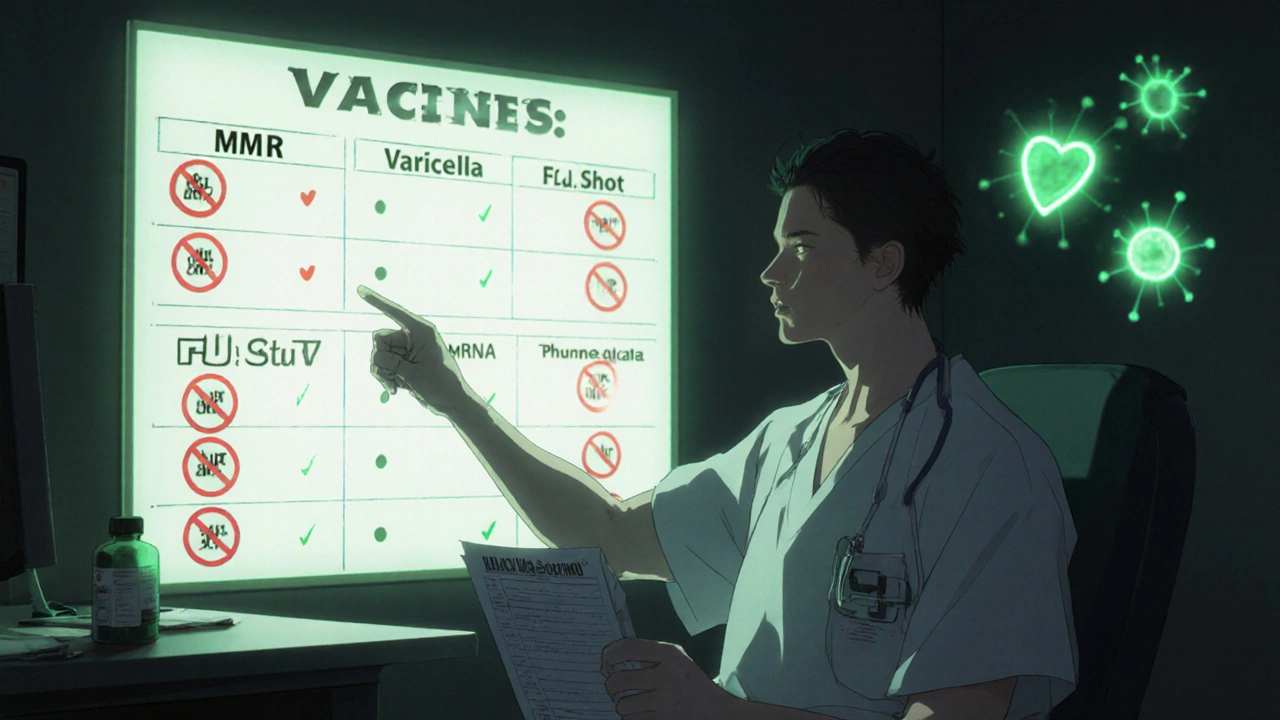Getting vaccinated while on immunosuppressants isn’t just about timing-it’s about survival. If you’re taking steroids, rituximab, methotrexate, or any drug that weakens your immune system, the wrong vaccine at the wrong time could put you in the hospital. The good news? There’s clear, updated guidance out there for 2025, and it’s not complicated if you know what to look for.
Live Vaccines Are Off-Limits for Most People on Immunosuppressants
Live vaccines contain a weakened version of the virus. That sounds harmless, right? Not if your immune system is already struggling. For people on immunosuppressants, even a weakened virus can multiply out of control and cause real disease.
The MMR vaccine (measles, mumps, rubella), varicella (chickenpox), and the old Zostavax shingles shot are all live vaccines. They’re completely off-limits if you’re on moderate to severe immunosuppression. Even the nasal spray flu vaccine-LAIV-is banned for this group. The BC Centre for Disease Control’s 2025 guidelines make it plain: if you’re on anything stronger than low-dose prednisone, don’t get these.
There’s one rare exception: if you’re on less than 20 mg of prednisone daily and your specialist says it’s safe, you *might* be cleared. But that’s not the norm. Most patients on biologics, chemotherapy, or transplant meds should never get live vaccines. Ever.
Inactivated Vaccines Are Safe-But Only If You Time Them Right
Inactivated vaccines use dead viruses or parts of them. No live material. No risk of causing infection. That’s why they’re the go-to for immunocompromised people. But here’s the catch: they don’t always work as well.
Studies show only 15% to 85% of people on immunosuppressants develop strong antibody responses to mRNA COVID-19 vaccines, compared to over 90% in healthy people. That’s why timing matters more than the vaccine itself.
For those on rituximab or ocrelizumab-B-cell depleting drugs-you need to wait at least six months after your last dose before getting vaccinated. The best window? Three to six months after your last infusion, when your B-cells are starting to come back. If you’re still on the drug, schedule your shot about four weeks before your next infusion.
For people on cyclophosphamide, vaccines should be given during the "nadir week"-when your white blood cell count is recovering between cycles. If you’re on methotrexate, some patients have seen better results by skipping their weekly dose for one week after each vaccine dose. It’s not official policy everywhere, but real people are reporting success with it.
Which Vaccines Are Actually Recommended?
Here’s what you need annually or routinely, based on the IDSA 2025 guidelines:
- Influenza: Annual inactivated flu shot (not the nasal spray). No extra doses needed.
- COVID-19: Two doses of the 2025-2026 mRNA vaccine (Pfizer or Moderna) or one dose of Novavax. More may be added based on your condition.
- Pneumococcal: PCV20 (Prevnar 20) or PCV15 + PPSV23 (Pneumovax 23). These protect against pneumonia and bloodstream infections.
- Hepatitis B: Three-dose series (Engerix-B, Recombivax HB) or two-dose Heplisav-B. Essential if you’re on dialysis or have liver disease.
- Tdap: One dose of tetanus, diphtheria, pertussis. Then Td every 10 years.
These are the only ones you need to focus on. Don’t waste time chasing shingles shots unless you’re on a very low dose of immunosuppressants and your doctor says yes. The new Shingrix shot (recombinant, not live) is safe and recommended-but only if you’ve waited long enough after your last biologic.

Why Timing Matters More Than You Think
One patient in Sydney, on rituximab for lupus, got her COVID booster three weeks before her infusion. Her antibody levels stayed flat. The next time, she waited five months after her last dose and got the shot two weeks before her next infusion. Her antibody count tripled.
That’s not luck. It’s science. Your immune system needs breathing room. If you get vaccinated while your body is flooded with drugs that kill immune cells, the vaccine has no chance to work.
Doctors are now using ICD-10 codes like Z94.0 (kidney transplant), D47.Z (chronic leukemia), and L40.5 (psoriatic arthritis on biologics) to flag patients who need special scheduling. Epic’s EHR system now auto-alerts providers when a patient on immunosuppressants is due for a vaccine. That’s new in 2025.
What About Household Contacts?
Getting your vaccine right isn’t enough. Your family, partner, or caregiver needs to be protected too. The IDSA guidelines say this: if you’re immunocompromised, everyone you live with should be fully vaccinated-especially for flu, COVID, and pertussis.
A 2025 study showed that when household members were up to date on vaccines, transmission to the immunocompromised person dropped by 57%. That’s the difference between getting sick and staying healthy.
So if your kid is due for MMR, go ahead-get it. They’re not on immunosuppressants. But if you’re the one with the transplant or the autoimmune disease, you can’t rely on them to protect you. You need your own protection, and you need it timed perfectly.

Barriers and Real-Life Problems
Even with perfect guidelines, things go wrong.
One Reddit user shared how her oncologist scheduled her for the nasal flu vaccine while she was on rituximab. She had to cancel at the last minute after her infectious disease specialist stepped in. Another patient in Melbourne waited months for the updated COVID vaccine because her local pharmacy kept running out. She missed her window and got sick during winter.
Access is still a problem. Some places still require a prescription for updated vaccines, even though Medicare Part D now covers them with no cost-sharing through 2026. That creates delays. And not every clinic knows the rules. Only 62% of community oncology practices have standardized vaccination schedules, according to ASCO’s 2025 survey.
The solution? Ask for help. Use the IDSA’s free online decision tool (launched November 2025) that builds your custom schedule based on your meds. Call the CDC’s 24/7 consultation line. Bring your medication list to every appointment. Don’t assume your doctor knows.
What’s Coming Next?
By 2026, we’ll likely see new vaccines designed specifically for immunocompromised people. Right now, researchers are testing adjuvanted versions-vaccines with added immune boosters-to help those with weak responses. A registry of 5,000 patients is tracking long-term results. And within five years, doctors may use point-of-care blood tests to check your immune readiness before giving you a shot.
For now, the rules are clear: avoid live vaccines. Get inactivated ones at the right time. Coordinate with your care team. And don’t let anyone tell you it’s "too risky" to vaccinate-you’re at higher risk if you don’t.
Can I get the flu shot if I’m on steroids?
Yes, but only the inactivated flu shot (the injection), not the nasal spray. If you’re on 20 mg or more of prednisone daily for 14 days or longer, wait until your dose drops below 20 mg if possible. If you can’t reduce it, get the shot anyway-it’s still safer than getting the flu.
Is the COVID-19 vaccine safe for transplant patients?
Yes, and it’s strongly recommended. Transplant patients need two doses of the 2025-2026 mRNA vaccine, even if they’ve been vaccinated before. Timing matters: wait at least three months after transplant surgery, and coordinate with your anti-rejection meds. Some centers delay the first dose until 1-3 months post-transplant to avoid interfering with organ acceptance.
What if I missed my vaccine window because of a drug shortage?
Don’t panic. Get the vaccine as soon as it’s available. While timing is ideal, protection is still better than none. If you’re on rituximab or similar drugs, you may need an extra dose later. Talk to your specialist about whether you need to repeat any shots. The CDC says it’s safe to get additional doses even if you’re late.
Can I get the shingles vaccine while on immunosuppressants?
You can get Shingrix-the non-live version-but only if you’re not on high-dose immunosuppressants. It’s safe for people on low-dose steroids or methotrexate. If you’re on biologics like adalimumab or rituximab, wait at least six months after your last dose. Never get Zostavax-it’s live and banned for this group.
Do I need to stop my medication before getting vaccinated?
Only in specific cases. For methotrexate, some patients skip one dose after vaccination to improve response. For rituximab, you can’t stop it-you have to time the vaccine around it. Never stop any immunosuppressant without your doctor’s approval. The risk of a disease flare can be worse than a weaker vaccine response.
If you’re on immunosuppressants, your vaccination plan isn’t optional-it’s part of your treatment. Work with your team. Use the tools available. And remember: the goal isn’t perfection. It’s protection.

